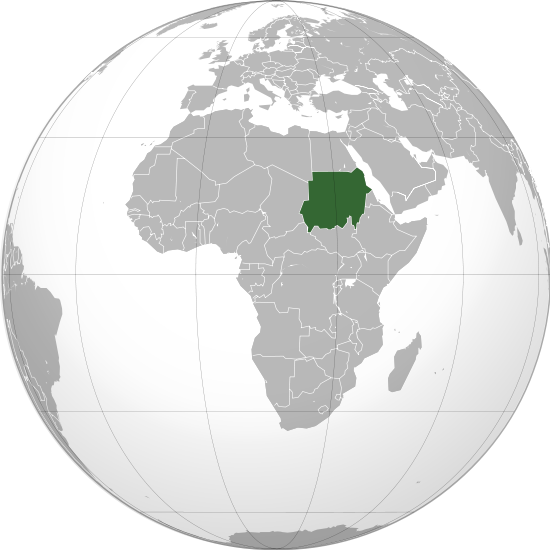 Sudan (pronounced /suːˈdæn/ soo–DAN; officially the Republic of the Sudan) (Arabic: السودان As Sūdān) is a country in northeastern Africa. It is the largest country in Africa, and tenth largest in the world by area.
Sudan (pronounced /suːˈdæn/ soo–DAN; officially the Republic of the Sudan) (Arabic: السودان As Sūdān) is a country in northeastern Africa. It is the largest country in Africa, and tenth largest in the world by area.
It is bordered by Egypt to the north, the Red Sea to the northeast, Eritrea and Ethiopia to the east, Kenya and Uganda to the southeast, the Democratic Republic of the Congo and the Central African Republic to the southwest, Chad to the west and Libya to the northwest. The world’s longest river, the Nile, divides the country between east and west sides.
The people of Sudan have a long history extending from antiquity, which is intertwined with the history of Egypt, with which it was united politically over several periods.
After gaining independence from Egypt and the United Kingdom in 1956, Sudan suffered a civil war, lasting 17 years, subsequently followed by ethnic, religious and economic conflicts between the Northern Sudanese (with Arab and Nubian roots), and the Christian and animist Nilotes of Southern Sudan. This led to a second civil war in 1983, and due to continuing political and military struggles, Sudan was seized in a bloodless coup d’état by colonel Omar al-Bashir in 1989, who thereafter proclaimed himself President of Sudan.
Sudan then achieved great economic growth by implementing macroeconomic reforms and finally ended the civil war by adopting a new constitution in 2005 with rebel groups in the south, granting them limited autonomy to be followed by a referendum about independence in 2011.
Rich in natural resources such as petroleum and crude oil, Sudan’s economy is currently amongst the fastest growing in the world. The People’s Republic of China and Japan are the main export partners of Sudan.
After an Islamic legal code was introduced on a national level, the ruling National Congress (NCP) established themselves as the sole political party in the state and has since supported the use of recruited Arab militias in guerrilla warfare, such as in the ongoing conflict in Darfur. Because thousands of people were displaced and killed, the need for humanitarian care in Darfur has attracted worldwide attention, and the conflict has been described as a genocide.
Officially a federal presidential representative democratic republic, the politics of Sudan are widely considered by the international community to take place within an authoritarian dictatorship due to the influence of the NCP. These factors led to the termination of diplomatic relations between Sudan and Chad, obstructed humanitarian assistance to the civilian population and has even led to war crimes charges being issued against members of the Sudanese government.
On 4 March 2008, the International Criminal Court (ICC) issued an arrest warrant for President Omar al-Bashir on charges of war crimes and crimes against humanity, the first sitting head of state ever indicted by the ICC. Sudan has also been the subject of severe sanctions due to alleged ties with Egyptian Islamic Jihad and al-Qaeda.
Sudan has scored medium in human development in the last few years, ranking #150 in 2009, between Haiti and Tanzania. Statistics indicate that about 17% of the population live on less than US $1.25 per day.
A member of the United Nations, Sudan also maintains membership with the AU, LAS, OIC and NAM, as well as serving as an observer in WTO. Its capital is Khartoum, which serves as the political, cultural and commercial centre of the nation, while Omdurman remains the largest city. Among Sudan’s population of 42 million people, Sunni Islam is the official and largest religion, while Arabic and English are the official languages.

Notes from Wikipedia








